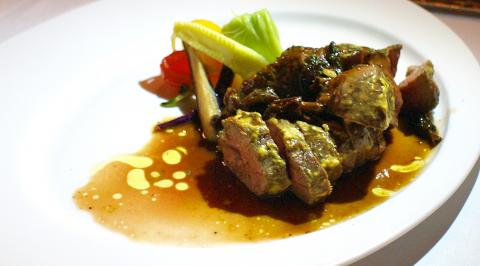Jay Chou’s (周杰倫) restaurant Deja Vu, I thought to myself as I entered it last weekend, will probably follow one of two trajectories, much the same way his career in the entertainment industry has. It will either be a resounding success like the pop music that has made him a household name, or it will be a dud like Pandamen (熊貓人), the television drama he directed that was universally panned by critics and audiences because of its goofy premise and trite plot.
Opened last summer in Huashan 1914 Creative Park (華山1914), Deja Vu at first feels like a finely crafted work of art. With its vaulted arcades supported by stone columns and exposed cement walls adorned with framed paintings of landscapes and portraits of renowned composers, it is immediately appealing. As you move further in, however, it’s Pandamen all the way. The oil paintings are in fact posters and the sumptuous architectural flourishes are offset incongruously by Chou’s gigantic Batmobile, its black surface reflecting the interior’s kaleidoscope of crass disco lighting.
Sure, the Batmobile is sleek and cool and something you’ve probably never seen before, but a car doesn’t belong in the center of a dining room. During my visit, several amateur photographers went up to snap the auto (this reviewer included), bumping chairs and setting off flashbulbs in the process.

Photo: Noah Buchan, Taipei Times
Kitschy movie set production values aside, our party of nine was still prepared to give the service and food the benefit of the doubt. And like the design, the service started out well.
When our party ordered the seafood pizza (NT$480), our server, dressed in formal black, suggested another dish because we had already ordered the seafood risotto (NT$680 for two), which contains similar ingredients. For the first 15 minutes, or so, our water glasses remained full. But when asked if the pasta with clams contained white wine, our server said she didn’t know and she didn’t bother to check. After our main courses were served, our water glasses were not filled up. That was disappointing because the dishes were over-seasoned with salt. This was especially true of the potato and sausage pizza (NT$360) and spaghetti with garlic and clams (NT$420). Both were presented beautifully, but the thin-crust pizza was flavorless and soggy. The pasta, cooked to al dente perfection, contained too much garlic, which overpowered the subtler flavor of the clams.
For many of the dishes, we wondered what we were paying for. The portions of the tapas for two (NT$420), with its array of smoked salmon, foie gras, salami, seasoned octopus and pickled artichoke and garlic, were laughably small and it was obvious that much of it had come from a packet.
Whereas the pizza and pasta left us pining for water, the oven-baked lamb with herb and mustard wine sauce (NT$780) barely registered on the taste buds. The meat was baked to a rosy red hue and tastefully arranged on the plate, but the sauce was bland and the vegetable portions a miniscule and overcooked afterthought. The seafood risotto is the only dish I would consider ordering again. With its generous portions of scallops, shrimp, clams and crabmeat cooked in a buttery white wine sauce, it was a unanimous favorite.
Deja Vu seems to be playing off the fame of its owner. Go for the car, but not the food.

On April 26, The Lancet published a letter from two doctors at Taichung-based China Medical University Hospital (CMUH) warning that “Taiwan’s Health Care System is on the Brink of Collapse.” The authors said that “Years of policy inaction and mismanagement of resources have led to the National Health Insurance system operating under unsustainable conditions.” The pushback was immediate. Errors in the paper were quickly identified and publicized, to discredit the authors (the hospital apologized). CNA reported that CMUH said the letter described Taiwan in 2021 as having 62 nurses per 10,000 people, when the correct number was 78 nurses per 10,000

As we live longer, our risk of cognitive impairment is increasing. How can we delay the onset of symptoms? Do we have to give up every indulgence or can small changes make a difference? We asked neurologists for tips on how to keep our brains healthy for life. TAKE CARE OF YOUR HEALTH “All of the sensible things that apply to bodily health apply to brain health,” says Suzanne O’Sullivan, a consultant in neurology at the National Hospital for Neurology and Neurosurgery in London, and the author of The Age of Diagnosis. “When you’re 20, you can get away with absolute

May 5 to May 11 What started out as friction between Taiwanese students at Taichung First High School and a Japanese head cook escalated dramatically over the first two weeks of May 1927. It began on April 30 when the cook’s wife knew that lotus starch used in that night’s dinner had rat feces in it, but failed to inform staff until the meal was already prepared. The students believed that her silence was intentional, and filed a complaint. The school’s Japanese administrators sided with the cook’s family, dismissing the students as troublemakers and clamping down on their freedoms — with

As Donald Trump’s executive order in March led to the shuttering of Voice of America (VOA) — the global broadcaster whose roots date back to the fight against Nazi propaganda — he quickly attracted support from figures not used to aligning themselves with any US administration. Trump had ordered the US Agency for Global Media, the federal agency that funds VOA and other groups promoting independent journalism overseas, to be “eliminated to the maximum extent consistent with applicable law.” The decision suddenly halted programming in 49 languages to more than 425 million people. In Moscow, Margarita Simonyan, the hardline editor-in-chief of the